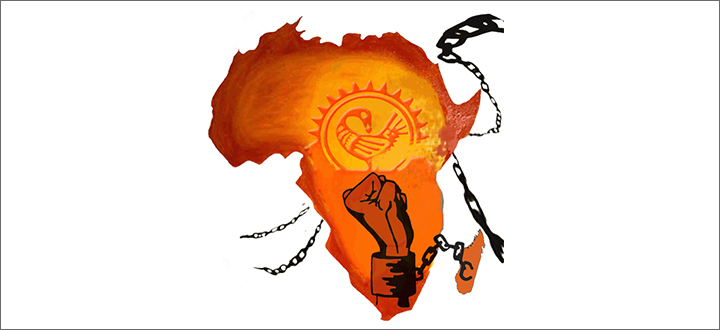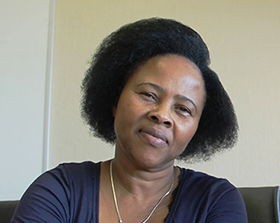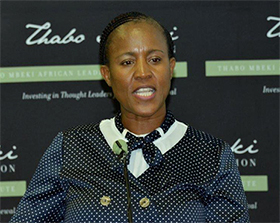News & Events
Africa Day: Unisa a leader in decolonising African education
Unisa is deeply engaged in the project of decoloniality and social justice in education. This is the sentiment shared by Professor Zodwa Motsa, Executive Director in the university’s Department of Leadership and Transformation during the celebration of Africa Day and Africa Month 2021.

Motsa says that Unisa is, in fact, considered the capital of decoloniality since its distinguished Decoloniality Summer School (hosted by the College of Human Sciences since 2014), which tackles critical focus areas on the subject, preceded local decolonial movements such as #RhodesMustFall.
“With the Summer School’s focus on precepts of colonisation, identities, histories and the politics of being, and presented by leading decolonial scholars such as Professors Sabelo Ndlovu-Gatsheni, Ramon Grosfoguel, Nelson Maldonado-Torres, Lewis Gordon, and Mogobe Ramose, Unisa has long demonstrated the significance it places on the decolonisation of education in Africa,” says Motsa.

Professor Zodwa Motsa, Executive Director in the university’s Department of Leadership and Transformation
Building momentum over decades
Motsa also says that Unisa’s pre-2011 era, in particular 1994 to 2000, prepared the university for this moment of professing on decoloniality. “There was a focus on equity ideals during the era of Vice-Chancellors Professors Anthony Melck and Marinus Wiechers, which coincided with the continent’s debates by black academics in places like Makerere University in Uganda and University of Dar es Salaam in Tanzania, which began to agitate for Africanisation,” she says. “The era of Professor Barney Pityana (2001-2010) boldly advanced Africanisation in many ways, laying a solid ground for the leadership that was to follow.”
Motsa says that after Professor Mandla Makhanya assumed the Vice-Chancellor position in 2011, the African identity was even more crisply articulated. “This is largely visible in the African value system that now reverberates throughout the university,” says Motsa. “This can be seen in various spaces at Unisa, such as the African Scholar Seminars, the Africa Speaks Lecture Series, the Decoloniality Summer School, the renaming of buildings, the honorary degrees awarded to deserving giants on the African continent, institutionalising transformation through the Change Management Unit (CMU), the Department of Leadership and Transformation (DLT), and the translation of learning materials.”
Moreover, this remarkable momentum continues. “For over 20 years,” says Motsa, “Unisa has been evolving and making strides in the centring of Africa within local lenses, thus decolonising education. And this is set to continue under the leadership of our new Vice-Chancellor, Professor Puleng LenkaBula.”

Professor Edith Phaswana, Head of the Academic Programmes at the TM-School
Curricula guided by African-centred philosophies
Another entity that forms part of Unisa’s African value system and further demonstrates its commitment to the decolonisation of education is the Thabo Mbeki African School of Public and International Affairs (TM-School). This graduate school aims to advance public sector education and seeks to be a magnet of excellence in education, experiential learning and research.
According to Professor Edith Phaswana, Head of the Academic Programmes at the TM-School, as an African school it is focused on training students to be able to provide the most required solutions for Africa’s renewal. “As a result, our curriculum is guided by African-centred philosophies, epistemologies, pedagogies and methodologies,” she says. “While this does not exclude acceptable global knowledge which advances humanity, it is our role as academics to, when designing curricula, go further and interrogate and question the appropriateness of classical texts on how they represent Africa and Africans.”
Phaswana says the TM-School aims to transcend the limited scope of disciplinary worldviews. “We want to put emphasis on social purpose of education,” she says. “We critique and reformulate the status quo imposed by dominant assumptions in scientific generation. We aim to structure knowledge towards unity. We also rely on feedback from academic and non-academic communities in developing curricula. Indigenous knowledge systems, processes and institutions are privileged, studied and adapted for their relevance to existential realities of the peoples of Africa and those of African descent worldwide.”
Unisa researchers disseminate decolonised knowledges
In order for Unisa to continue and sustain its commitment to the decolonisation of education in Africa, the university’s scholars need to be fully engaged and immersed in decolonial research, say Motsa and Phaswana. According to Phaswana, the decolonisation of education is not subject-specific, but rather a holistic process of de-hierarchisation as knowledge across all the disciplines is hierarchised in such a way that western ways of knowing are privileged over others. “For instance,” she says, “look at how we train medical practitioners; why is acupuncture and Ayurvedic medicines not part of the pool of knowledge learnt at our university? Why are all seminal and classical texts in literature in European languages? All disciplines will need to pause and listen to other ways of knowing.”
Paraphrasing the seminal African decolonial scholar, Professor Ndlovu-Gatsheni, Phaswana advises researchers at Unisa to dig deep into the African archives. “The university’s scholars should go back to the archives and begin to question what constitutes knowledge for the advancement of humanity in the African sense,” she says. “At least Unisa is one of those universities which openly engages in this discourse. Unisa researchers are able to disseminate decolonised knowledges in scholarly works for the world to consume, and they are counted among world decolonial scholars and theorists. It is incumbent upon these prominent scholars to convey this knowledge to the younger generation though postgraduate training. Our researchers must expose students to the required analytical tools and methodologies.”
Research support structures must transform
Motsa says that the structures that guide research undertakings and publishing should also support the university’s commitment to decolonising education on the continent. “Unisa can re-centre the African identity by examining its research practices and policies that dehumanise and/or marginalise the researcher and student,” she says. “The relationship between community and researcher should also be managed so that there is no exploitation of the powerless by the hands that hold the power. Additionally, the language of research should represent the country in which the university is located.”
Motsa further states that throughout the university’s various departments, the power is sometimes located in the hands of a few, usually white staff members, and the black staff, who are often junior lecturers, do not get the full experience of being mentored and groomed in the research enterprise as they have to do most of the marking and teaching while research time is very limited.
Motsa adds that the Higher Degrees Committees (HDCs) also need to transform. “Some HDCs perpetrate the culture of domination where certain groups are afforded opportunities to supervise, while others are not,” she concludes. “Again, certain people get the privilege to choose whom to supervise while others must make do with what is left over. This is not just. It stunts progress. Publication enterprise is yet another area that requires transformation for decolonisation of education in Africa to be achieved. Who gets published and what mechanisms are in place to advance the grooming of nascent scholars to become publishing scholars?”
While these existing challenges within the South African and continental research landscape might hinder Unisa’s decolonisation of education project, both Motsa and Phaswana indicate that this will not stop the commitment of the university to being a lever for building an Africa that the continent’s people yearn for, and deserve.
* By Rivonia Naidu-Hoffmeester
Publish date: 2021-05-25 00:00:00.0

